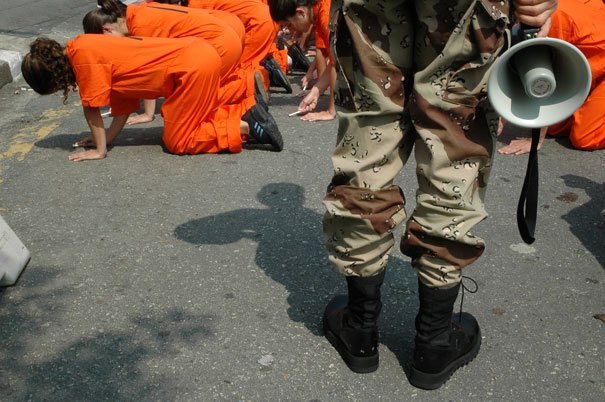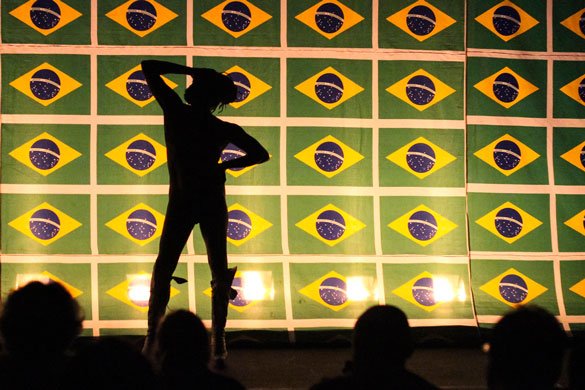Exhibition
Sense of Doubt Resisting Oblivion
11 September - 11 October 2015


It takes a well-developed sense of doubt to counter the narratives of power. To awaken and sharpen this sense is the aim of the scholarly-artistic project Sense of Doubt: Resisting Oblivion taking place within the context of The Formation of Normative Orders, a Cluster of Excellence of Frankfurt’s Goethe-Universität.
From 11 September to 11 October 2015, the Museum Angewandte Kunst in Frankfurt am Main and the adjoining park became the arena for Sense of Doubt. With a unique combination of the moving image – in the form of the video art exhibition memórias inapagáveis realized in a temporary container landscape in the museum garden – and a concentrated programme of public lectures, panel discussions and guided tours by members of the Cluster of Excellence, the project shed light on the cultural, social and political construction of memories, bring what we have repressed back to the surface, and make us aware of alternatives.
Memories of past events, both individual and collective, manifest themselves in images and narratives, and it is in these forms that they are shared with others and passed on to posterity. At the same time, however, these images and narratives are always interpretations.
If memory is selective, puts experience in a certain light, reconstructs past events, that is all the more true of the images and narratives embodying memory. When the subject in question is an entire society’s past, the reconstructive character of the memorial narrative – whether in the form of images, films or stories – is determined to a decisive degree by the respective power structure.
Again and again, certain memorial narratives gain acceptance as the prevailing ones; their images shape the collective image, their narratives dominate the public discourse. This applies above all to the multifarious conflicts between North and South, the rich and the poor, the powerful and the weak regions of the world. These conflicts often date far back to the age of slave trade between Africa, Europe and North America; they culminate in terrorist attacks such as 9/11 or the wars and civil wars of the Middle East. What was seen, said and told in these contexts, but also what is withheld, denied, forgotten and repressed, always bears traces and traits of power.
The video art exhibition memórias inapagáveis (“ineradicable memories”) presented eighteen films from the extensive holdings of the Assoçião Cultural Videobrasil, which have been amassed since as far back as the 1980s. In addition to international video artworks, the collection also comprised interview recordings and documentaries. One focus is on artists of the South: Latin America, Africa, Eastern Europe, Asia and the Mideast. The works address direct and indirect North-South conflicts of the past and present.
The project Sense of Doubt featured a selection of these works made by the internationally renowned Spanish curator Agustín Pérez Rubio. It encompassed films about more distant pasts such as the slave trade between Africa and Brazil, more recent ones such as the military coup in Chile, the struggle of the African aborigines against the oil company Elf Aquitaine, the massacre on Tiananmen Square in Beijing, or the historical uprisings against apartheid in South Africa, but also current situations such as the civil war in Lebanon, the Guantanamo Bay detention camp, the terrorist attacks of September 11, 2001, or the current migration movements.

Echoing the onetime interpretation of the Frankfurt School’s Critical Theory contributions in exile as a kind of “message in a bottle”, the video artworks from the world of the global South travel in freight containers to the scholars of Frankfurt, who then allow them to awaken their sense of doubt. In dialogue with the exhibition visitors, the members of the Cluster of Excellence publicly air their Sense of Doubt by experimentally demonstrating the narratives told by the videos, what they make us conscious of, and how they can change our accustomed images.
Subscribing to a combination of video art and scholarship to direct our gaze towards often painful pasts, the project Sense of Doubt also localizes itself within the context of the B3 Biennial of the Moving Image 2015 – Expanded Senses. The past is thus mirrored in the present, and safeguarded from repression and oblivion. Memory is expanded, but without attributing the artists or scholars the authority of superior knowledge, and without trying to indoctrinate the viewer.